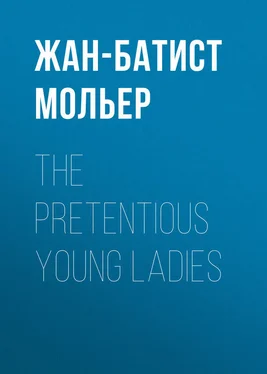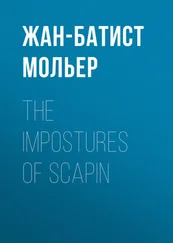Жан-Батист Мольер - The Pretentious Young Ladies
Здесь есть возможность читать онлайн «Жан-Батист Мольер - The Pretentious Young Ladies» — ознакомительный отрывок электронной книги совершенно бесплатно, а после прочтения отрывка купить полную версию. В некоторых случаях можно слушать аудио, скачать через торрент в формате fb2 и присутствует краткое содержание. Жанр: foreign_antique, foreign_prose, foreign_dramaturgy, на английском языке. Описание произведения, (предисловие) а так же отзывы посетителей доступны на портале библиотеки ЛибКат.
- Название:The Pretentious Young Ladies
- Автор:
- Жанр:
- Год:неизвестен
- ISBN:нет данных
- Рейтинг книги:4 / 5. Голосов: 1
-
Избранное:Добавить в избранное
- Отзывы:
-
Ваша оценка:
- 80
- 1
- 2
- 3
- 4
- 5
The Pretentious Young Ladies: краткое содержание, описание и аннотация
Предлагаем к чтению аннотацию, описание, краткое содержание или предисловие (зависит от того, что написал сам автор книги «The Pretentious Young Ladies»). Если вы не нашли необходимую информацию о книге — напишите в комментариях, мы постараемся отыскать её.
The Pretentious Young Ladies — читать онлайн ознакомительный отрывок
Ниже представлен текст книги, разбитый по страницам. Система сохранения места последней прочитанной страницы, позволяет с удобством читать онлайн бесплатно книгу «The Pretentious Young Ladies», без необходимости каждый раз заново искать на чём Вы остановились. Поставьте закладку, и сможете в любой момент перейти на страницу, на которой закончили чтение.
Интервал:
Закладка:
Molière
The Pretentious Young Ladies
Molière began in The Pretentious Young Ladies to paint men and women as they are; to make living characters and existing manners the ground-work of his plays. From that time he abandoned all imitation of Italian or Spanish imbroglios and intrigues.
There is no doubt that aristocratic society attempted, about the latter years of the reign of Louis XIII., to amend the coarse and licentious expressions, which, during the civil wars had been introduced into literature as well as into manners. It was praiseworthy of some high-born ladies in Parisian society to endeavour to refine the language and the mind. But there was a very great difference between the influence these ladies exercised from 1620 until 1640, and what took place in 1658, the year when Molière returned to Paris. The Hôtel de Rambouillet, and the aristocratic drawing-rooms, had then done their work, and done it well; but they were succeeded by a clique which cared only for what was nicely said, or rather what was out of the common. Instead of using an elegant and refined diction, they employed only a pretentious and conceitedly affected style, which became highly ridiculous; instead of improving the national idiom they completely spoilt it. Where formerly D'Urfe, Malherbe, Racan, Balzac, and Voiture reigned, Chapelain, Scudéry, Ménage, and the Abbé Cotin, "the father of the French Riddle," ruled in their stead. Moreover, every lady in Paris, as well as in the provinces, no matter what her education was, held her drawing-room, where nothing was heard but a ridiculous, exaggerated, and what was worse, a borrowed phraseology. The novels of Mdlle. de Scudéry became the text-book of the précieux and the précieuses , for such was the name given to these gentlemen and ladies who set up for wits, and thought they displayed exquisite taste, refined ideas, fastidious judgment, and consummate and critical discrimination, whilst they only uttered vapid and blatant nonsense. What other language can be used when we find that they called the sun l'aimable éclairant le plus beau du monde, l'epoux de la nature , and that when speaking of an old gentleman with grey hair, they said, not as a joke, but seriously, il a des quittances d'amour . A few of their expressions, however, are employed even at the present time, such as, châtier son style ; to correct one's style; dépenser une heure , to spend an hour; revètir ses pensées d'expressions nobles , to clothe one's thoughts in noble expressions, etc.
Though the précieux and précieuses had been several times attacked before, it remained for Molière to give them their death blow, and after the performance of his comedy the name became a term of ridicule and contumely. What enhanced the bitterness of the attack was the difference between Molière's natural style and the affected tone of the would-be elegants he brought upon the stage.
This comedy, in prose, was first acted at Paris, at the Théâtre du Petit Bourbon, on the 18th of November, 1659, and met with great success. Through the influence of some noble précieux and précieuses it was forbidden until the 2d of December, when the concourse of spectators was so great that it had to be performed twice a day, that the prices of nearly all the places were raised (See Note 7, page xxv.), and that it ran for four months together. We have referred in our prefatory memoir of Molière to some of the legendary anecdotes connected with this play.
It has also been said that our author owed perhaps the first idea of this play to a scarcely-known work, le Cercle des Femmes, ou le Secret du Lit Nuptial; entretiens comiques , written by a long-forgotten author, Samuel Chapuzeau, in which a servant, dressed in his master's clothes, is well received by a certain lady who had rejected the master. But as the witty dialogue is the principal merit in Molière's play, it is really of no great consequence who first suggested the primary idea.
The piece, though played in 1659, was only printed on the 29th of January, 1660, by Guillaume de Luyne, a bookseller in Paris, with a preface by Molière, which we give here below:
A strange thing it is, that People should be put in print against their Will. I know nothing so unjust, and should pardon any other Violence much sooner than that.
Not that I here intend to personate the bashful Author, and out of a point of Honour undervalue my Comedy. I should very unseasonably disoblige all the People of Paris, should I accuse them of having applauded a foolish Thing: as the Public is absolute Judge of such sort of Works, it would be Impertinence in me to contradict it; and even if I should have had the worst Opinion in the World of my Pretentious Young Ladies before they appeared upon the Stage, I must now believe them of some Value, since so many People agree to speak in their behalf. But as great part of the Pleasure it gave depends upon the Action and Tone of the Voice, it behooved me, not to let them be deprived of those Ornaments; and that success they had in the representation, was, I thought, sufficiently favorable for me to stop there. I was, I say, determined, to let them only be seen by Candlelight, that I might give no room for any one to use the Proverb; [Footnote: In Molière's time it was proverbially said of a woman, " Elle est belle a la chandelle, mais le grand jour gate tout ." She is beautiful by candle-light, but day-light spoils everything.] nor was I willing they should leap from the Theatre de Bourbon into the Galerie du Palais . [Footnote: The Galerie du Palais was the place where Molière's publisher lived.] Notwithstanding, I have been unable to avoid it, and am fallen under the Misfortune of seeing a surreptitious Copy of my Play in the Hands of the Booksellers, together with a Privilege, knavishly obtained, for printing it. I cried out in vain, O Times! O Manners! They showed me that there was a Necessity for me to be in print, or have a Law-suit; and the last evil is even worse than the first. Fate therefore must be submitted to, and I must consent to a Thing, which they would not fail to do without me.
Lord, the strange Perplexity of sending a book abroad! and what an awkward Figure an Author makes the first time he appears in print! Had they allowed me time, I should have thought it over better, and have taken all those Precautions which the Gentlemen Authors, who are now my Brethren, commonly make use of upon the like Occasions. Besides, some noble Lord, whom I should have chosen, in spite of his Teeth, to be the Patron of my Work, and whose Generosity I should have excited by an Epistle Dedicatory very elegantly composed, I should have endeavoured to make a fine and learned Preface; nor do I want books which would have supplied me with all that can be said in a scholarly Manner upon Tragedy and Comedy; the Etymology of them both, their Origin, their Definition, and so forth. I should likewise have spoken to my friends, who to recommend my Performance, would not have refused me Verses, either in French or Latin. I have even some that would have praised me in Greek, and Nobody is ignorant, that a Commendation in Greek is of a marvellous efficacy at the Beginning of a Book. But I am sent Abroad without giving me time to look about me; and I can't so much as obtain the Liberty of speaking two words, to justify my Intention, as to the subject of this Comedy. I would willingly have shewn that it is confined throughout within the Bounds of allowable and decent Satire, that Things the most excellent are liable to be mimicked by wretched Apes, who deserve to be ridiculed; that these absurd Imitations of what is most perfect, have been at all times the Subject of Comedy; and that, for the same Reason, that the truly Learned and truly Brave never yet thought fit to be offended at the Doctor or the Captain in a Comedy, no more than Judges, Princes, and Kings at seeing Trivelin, [Footnote: The Doctor and the Captain were traditional personages of the Italian stage; their parts need no further explanation; Trivelin was a popular Italian actor, who in a humorous and exaggerated way played the parts of Judges, Princes, and Kings.] or any other upon the Stage, ridiculously act the Judge, the Prince, or King; so the true Précieuses would be in the wrong to be angry, when the pretentious Ones are exposed, who imitate them awkwardly. In a Word, as I said, I am not allowed breathing time; Mr. de Luyne is going to bind me up this Instant: … let it be so, since the Fates so ordain it.
Читать дальшеИнтервал:
Закладка:
Похожие книги на «The Pretentious Young Ladies»
Представляем Вашему вниманию похожие книги на «The Pretentious Young Ladies» списком для выбора. Мы отобрали схожую по названию и смыслу литературу в надежде предоставить читателям больше вариантов отыскать новые, интересные, ещё непрочитанные произведения.
Обсуждение, отзывы о книге «The Pretentious Young Ladies» и просто собственные мнения читателей. Оставьте ваши комментарии, напишите, что Вы думаете о произведении, его смысле или главных героях. Укажите что конкретно понравилось, а что нет, и почему Вы так считаете.












